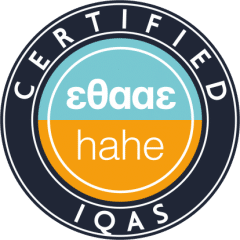Learning Outcomes
The course focuses on the concepts, technologies, workflows and best practices for organizing, archiving and preserving digital photographic content based on the life cycle of digital assets. Upon completion of the course students will have:
- Advanced knowledge on applying curating and organizing policies to related working environments, on designing workflows for creating and preserving photographic content, and on building best practices for discrete content uses.
- Advanced photo organizing skills for different workflows.
- Advance skills on designing, organizing and managing digital photographic resources.
General Competences
- Applying knowledge to practice
- Search, analyze and synthesize data and information, using the necessary technologies
- Adaptation to new situations
- Decision making
- Independent work / Teamwork
- Working in an international / interdisciplinary environment
- Project planning and management
- Exercising criticism and self-criticism
- Promoting free, creative and inductive thinking
- Perception of added value of photographic assets
Course Outline
The digital photographic archive – life cycle, real and conceptual structures, Organizing systems – in situ, cloud, Open source, Digital libraries and tools – commercial apps, Dynamic indexing and classification, Workflow and good practices, Storage environments and repositories, Digital Resources Documentation, Metadata: Languages, Descriptive Schemes and Metadata Processing, Nomenclature Schemes and Best Practices, Digital Formats and Workflow, Digital Photo Maintenance migration resources, policies, Copyright management, safeguarding and professional practices.
RECOMMENDED BIBLIOGRAPHY
- Zorich D., Fink E.. 1999. Introduction to Managing Digital Assets: Options for Cultural and Educational Organizations, Los Angeles: Getty Publications.
- Jacobsen J., Schlenker T., Edwards L. 2013. Implementing a Digital Asset management System. Burlington MA: Focal Press.
- Krogh P., 2009. The Dam Book, Digital Asset Management for Photographers. Sebastopol: O’Reilly Media
- Murtha B. 2016. Introduction to Metadata, Los Angeles: Getty Publications.
- Course notes
- Online resources
Course bibliography is dynamically formulated and is always available at the beginning of the semester through the Foundation’s asynchronous education platform.


